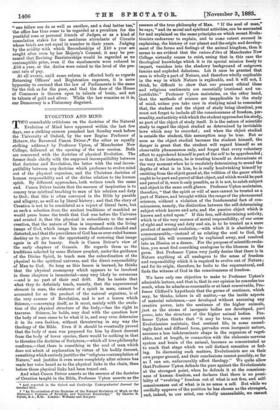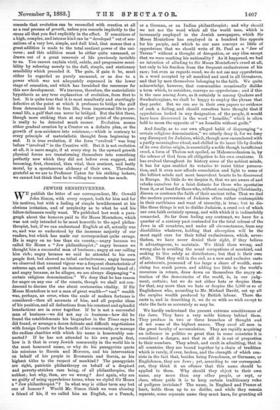EVOLUTION AND MIND.
TWO remarkable criticisms on the doctrine of the Natural Evolution of Mind have appeared within the last few days, one a striking sermon preached last Sunday week before the University of Oxford, 'by the new Regina Professor of Hebrew, the Reverend Canon Driver ;* the other an equally striking address,-f by Professor Upton, or Manchester New College, delivered at the opening of the new session. Both are concerned with the doctrine of physical Evolution. The former deals chiefly with the supposed incompatibility between that doctrine and Revelation, the latter with the real incom- patibility between any doctrine which professes to evolve mind out of the physical organism, and the Christian doctrine of human responsibility and of the divine relation to the human spirit. By different approaches, both writers reach the same end. Canon Driver insists that the essence of inspiration is to convey true spiritual teaching to man of his relation and duty to God; that this is often conveyed in the Bible by parable and allegory, as well as by literal history ; and that the story of Creation is not to be considered as a report of literal facts, but as such a selection from the ancient traditions of mankind as would press home the truth that God was before the Universe and created it, that the physical is subordinate to the moral creation, that the nature of Man is impressed with the living image of God, which image his own disobedience clouded and distorted, and that the providence of God has so over-ruled human destiny as to give us the opportunity of restoring that image again in all its beauty. Such is Canon Driver's view of the early chapters of Genesis. He regards them as the traditions selected by some Hebrew prophet, under the guidance of the Divine Spirit, to teach men the subordination of the physical to the spiritual universe, and the direct responsibility of Man to God. So long as this lesson is learned, he thinks that the physical cosmogony which appears to be involved in these chapters is immaterial—may very likely be erroneous —and is no part of their real drift. But he insists that what they do definitely teach, namely, that the supersensual element in man, the existence of a spirit in man, cannot be accounted for as the product of the natural organism, is of the very essence of Revelation, and is not a lesson which Science,—concerning itself, as it must, mainly with the evolu- tion of the physical structure of the body,—has the right to traverse. Science, he holds, may deal with the question how the body of man came to be what it is, and may even determine it in its own fashion, without threatening in any way the theology of the Bible. Even if it should be eventually proved that the body of man was prepared for him by direct descent from the body of lower species, there would be nothing in that to threaten the doctrine of Scripture,—which all true philosophy confirms,—that there is something in the soul of man which does not admit of explanation by virtue of his bodily descent, something which entirely justifies the "religious contemplation of Nature," and justifies it even more completely after science has made her voice heard as to the physical links in the chain, than before those physical links had been traced out.
And what Canon Driver asserts as the essence of the doctrine of Creation taught in the Bible, Professor Upton asserts as the
• And reported in the Oxford and Cambridge Undergraduates' Journal for October 25th.
t "An Examination of the Doctrine of the Natural Evolution of Mind, or the Distinctive Features of Scientific and Spiritual Knowledge." By Charles B. Upton, B.A., B.Sc. London : Williams and Norgate.
essence of the true philosophy of Man. " If the soul of man," he says, " and its moral and spiritual activities, can be accounted
for and explained on the same principles on which recent Evolu- tionists endeavour to explain, and to some extent succeed in explaining, the history of our planet and the origin and develop- ment of the forms and feelings of the animal kingdom, then it seems to me evident that the raison d'être of Manchester New College virtually ceases to exist, seeing that in this case the theological knowledge which it is its special mission freely to impart, vanishes into the shadowy background of outgrown fancies and exploded delusions. Let it once be granted that man is wholly a part of Nature, and therefore wholly explicable in the way in which Nature is explicable, and it will not, I think, be difficult to show that our present ethical ideas and religious sentiments are essentially irrational and un- justifiable." Professor Upton maintains, on the other hand, that the methods of science are inapplicable to the study of mind, unless you take care in studying mind to remember that, the student and the object of study being identical, you must not forget to include all the consciousness of freedom, per• sonality, and activity with which the student approaches his study, as part of the object of study itself. It is the nature of scientific study to regard the object studied as determined by inviolable laws which may be recorded ; and when the object studied is outside the student, this assumption may. be true. But so soon as the object studied becomes the student himself, the danger is great that the student will regard himself as an observable phenomenon only, and forget that every voluntary effort to apprehend himself is part of the self to be apprehended; so that if, for instance, he is treating himself as determinate at the very moment when he is resolutely determining to sound the depths of what is in him, he is really hoodwinking himself by omitting from the object gazed at, the volition of the gazer which ought to be part and parcel of that object, and which would be part and parcel of it, were it only possible, as it is not, to catch subject and object in the same swift glance. Professor Upton maintains, therefore, " that the spirit or will of man cannot be treated as a part of Nature, and brought within the range of the phenomenal sciences, without a -violation of the fundamental fact of con- sciousness, namely, the distinction between the self-determining subject which knows and acts, and the passive object which is known and acted upon." If this free, self-determining activity, which is of the very essence of moral responsibility, of our sense of right and wrong and duty and sin, is to be treated as a mere product of material evolution,—with which it is absolutely in- commensurable,—instead of as relating the soul to God, the spiritual life will necessarily be explained away, and resolved into an illusion or a dream. For the purpose of scientific evolu- tion, you must find something analogous to the blossom in the germ. But Professor Upton very justly denies that there is in Nature anything at all analogous to the sense of freedom and responsibility which it is required to evolve out of Nature ; and for its origin, therefore, he looks to the supernatural, and finds the witness of God in the consciousness of freedom.
We have only one objection to make to Professor Upton's admirable lecture, and that is, that in our opinion he concedes too much, when he admits as reasonable or at least conceivable, Pro- fessor Clifford's hypothesis that the germs of sentience, which may, he thinks, inhere in all matter,—as the inside aspects of material substance,—are developed without assuming any creative power, into the sentience of the higher animals, just as the atoms of inorganic bodies are developed, pan paean, into the structure of the higher animal bodies. Pro- fessor Upton thinks that "it may be true, as some recent Evolutionists maintain, that sentient life, in some exceed- ingly faint and diffused form, pervades even inorganic nature, assumes a less indeterminate shape in the organism of veget- ables, and at length, in connection with the elaborate nervous system and brain of the animal, becomes so concentrated as to reach that stage which we call distinct sensation or feel- ing. In discussing such matters, Evolutionists are on their own proper ground, and their conclusions cannot possibly, so far as I can see, unfavourably affect theology." We quite allow that Professor Upton defends the pass against the Evolutionists at the strongest point, when he defends it at the conscious- ness of human -freedom, and declares that there is no possi- bility of " evolving " freedom out of what is not free, and self- consciousness out of what is in no sense a self. But while we cordially approve of the position he has chosen as the strongest, and, indeed, to our mind, one wholly unassailable, we cannot concede that evolution can be reconciled with creation at all as a real process of growth, unless you concede implicitly to the cause all that you find explicitly in the effect. If sensations of a high, complex, and intense kind can be " developed " out of sen- sations of a very low, simple, and dull kind, that means that a great addition is made to the total sentient power of the uni- verse ; and this addition must be either quite uncaused, or drawn out of a great reservoir of life previously invisible to us. You cannot explain vivid, subtle, and progressive sensi- bility by referring merely to the dull, simple, and stationary sensibility which preceded it. The gain, if gain it be, must either be regarded as purely uncaused, or as due to a power which was not adequately expressed in the lower stage of sensation, and which has furnished the resources for this new development. We traverse, therefore, the materialistic hypothesis as any true explanation of evolution, from first to last. It is quite true that it is most manifestly and startlingly defective at the point at which it professes to bridge the gulf from determined life to free life, from impersonal life to per- sonal life, a gulf that can never be bridged. But the blot there, though more striking than at any other point of the process, is really to be detected much sooner. Evolution means either gradual creation by a Creator on a definite plan, or the growth of non-existence into existence,—which is contrary to every principle of materialistic thought from beginning to end. It is true evolution, if the form "evolved " was long before "involved " in the Creative will. But it is not evolution at all, it is mere magic, if at every step in the upward growth physical forces are transforming themselves into something perfectly new which they did not before even suggest, stud becoming, first, chemical, then vital, then sentient, and lastly moral, by a spontaneous alchemy of their own. Therefore, grateful as we are to Professor Upton for his striking lecture, we cannot but think that he is willing to concede too much.







































 Previous page
Previous page